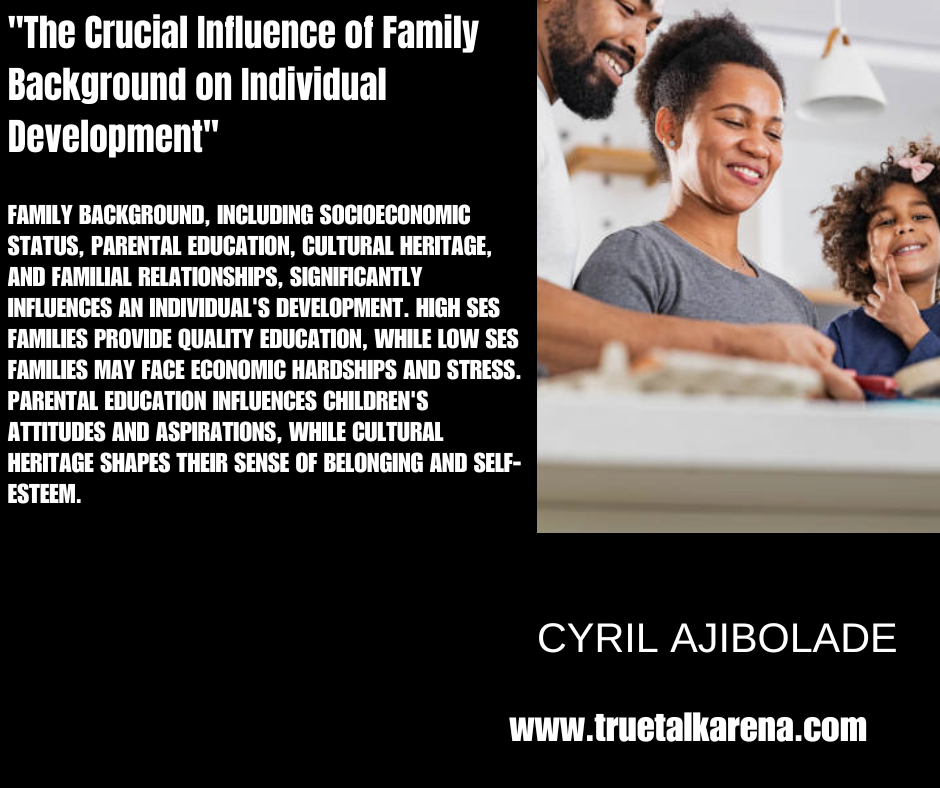
"THE CRUCIAL INFLUENCE OF FAMILY BACKGROUND ON INDIVIDUAL DEVELOPMENT"
The family unit serves as the foundational structure of society, shaping the values, beliefs, and behaviors of individuals. Family background, encompassing factors such as socioeconomic status, parental education, cultural heritage, and familial relationships, plays a pivotal role in the development of an individual.
This essay explores the multifaceted impact of family background on shaping personalities, aspirations, and opportunities, highlighting its significance in fostering both challenges and advantages in the journey of personal growth.
IMPACT OF SOCIOECONOMIC STATUS: Socioeconomic status (SES) is a key determinant of the resources and opportunities available within a family. High SES families often provide access to quality education, healthcare, and extracurricular activities, nurturing a supportive environment for holistic development. Conversely, individuals from low SES backgrounds may face economic hardships, limited access to educational resources, and increased stressors, impacting their academic performance, mental well-being, and future prospects. Research indicates that children from lower SES families are more likely to experience adverse outcomes such as academic underachievement, lower self-esteem, and increased susceptibility to social challenges.
PARENTAL EDUCATION AND ROLE MODELING: Parents serve as primary influencers in a child's life, shaping their attitudes, behaviors, and aspirations through direct guidance and implicit role modeling. The level of parental education significantly impacts the intellectual stimulation and academic support provided within the household. Parents with higher educational attainment are more likely to prioritize education, engage in literacy-promoting activities, and foster a culture of learning within the family. Conversely, children of parents with limited education may encounter barriers to academic achievement, stemming from a lack of academic support, guidance, and exposure to educational opportunities.
CULTURAL HERITAGE AND IDENTITY FORMATION: Family background encompasses cultural heritage, encompassing traditions, values, language, and customs passed down through generations. Cultural identity plays a fundamental role in shaping an individual's sense of belonging, self-esteem, and worldview. Families transmit cultural values and beliefs through storytelling, rituals, celebrations, and daily interactions, providing a framework for understanding one's place in society and fostering pride in one's heritage. Moreover, exposure to diverse cultural experiences within the family environment promotes empathy, tolerance, and appreciation for multiculturalism, enriching an individual's social and emotional development.
FAMILIAR RELATIONSHIPS AND SOCIALIZATION: The quality of familial relationships profoundly influences an individual's socioemotional development, interpersonal skills, and resilience. Positive family dynamics characterized by warmth, support, and effective communication promote emotional security, self-confidence, and healthy attachments. Conversely, dysfunctional family relationships marked by conflict, neglect, or abuse can have detrimental effects on mental health, self-esteem, and social functioning. Early experiences within the family unit serve as a template for navigating future relationships, shaping communication patterns, conflict resolution strategies, and intimacy expectations.
In conclusion, family background emerges as a critical determinant of individual development, exerting a profound and enduring influence on various facets of life. From shaping socioeconomic opportunities to nurturing intellectual curiosity, cultural identity, and emotional well-being, the family serves as a primary agent of socialization and support. Recognizing the significance of family background underscores the importance of equitable access to resources, support systems, and opportunities for all individuals, irrespective of their socio-demographic backgrounds. By fostering environments that promote inclusivity, resilience, and empowerment, societies can strive towards cultivating a future where every individual can realize their full potential, irrespective of their family background.



0 COMMENTS